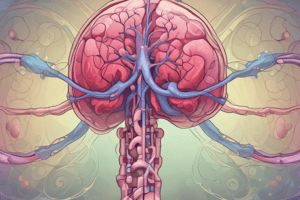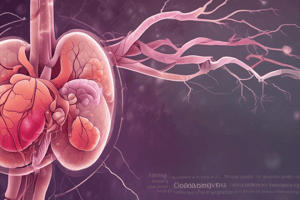Podcast
Questions and Answers
Which of the following hormones is responsible for stimulating erythropoiesis in the bone marrow?
Which of the following hormones is responsible for stimulating erythropoiesis in the bone marrow?
- Vasopressin
- Erythropoietin (correct)
- Renin
- Aldosterone
Angiotensin II is an enzyme secreted by the renal cortex.
Angiotensin II is an enzyme secreted by the renal cortex.
False (B)
What is the function of the proximal convoluted tubule in the nephron?
What is the function of the proximal convoluted tubule in the nephron?
Major nutrient reabsorption
The glomerulus is a spherical mass of capillaries surrounded by a membrane known as the _____________.
The glomerulus is a spherical mass of capillaries surrounded by a membrane known as the _____________.
What is the primary function of the collecting duct in the nephron?
What is the primary function of the collecting duct in the nephron?
What is the name of the enzyme secreted by the renal cortex in response to decreased Na intake, sodium loss, or hypovolemia?
What is the name of the enzyme secreted by the renal cortex in response to decreased Na intake, sodium loss, or hypovolemia?
The distal tubule is responsible for water reabsorption.
The distal tubule is responsible for water reabsorption.
Aldosterone acts on the _______________ to retain and reabsorb sodium and excrete potassium.
Aldosterone acts on the _______________ to retain and reabsorb sodium and excrete potassium.
Which segment of the nephron is primarily responsible for acid-base balance?
Which segment of the nephron is primarily responsible for acid-base balance?
Vasopressin is produced in the kidneys.
Vasopressin is produced in the kidneys.
What is the role of angiotensin II in the body?
What is the role of angiotensin II in the body?
The hormone __________ is responsible for stimulating red blood cell production in the bone marrow.
The hormone __________ is responsible for stimulating red blood cell production in the bone marrow.
Match the following renal hormones with their functions:
Match the following renal hormones with their functions:
What effect does aldosterone have on the distal tubule?
What effect does aldosterone have on the distal tubule?
The Loop of Henle is mainly responsible for nutrient reabsorption.
The Loop of Henle is mainly responsible for nutrient reabsorption.
Which hormone is activated by the influence of parathyroid hormone?
Which hormone is activated by the influence of parathyroid hormone?
The kidney secretes __________ in response to low sodium intake or hypovolemia.
The kidney secretes __________ in response to low sodium intake or hypovolemia.
What is the primary function of the glomerulus in the nephron?
What is the primary function of the glomerulus in the nephron?
Flashcards are hidden until you start studying
Study Notes
Glomerular Diseases
- The glomerulus is responsible for producing an ultrafiltrate and preventing certain substances from entering the ultrafiltrate.
- Nephrotic Syndrome is a cluster of symptoms characterized by increased glomerular permeability, marked proteinuria, oliguria, hyperlipidemia, and a low metabolic rate.
Nephrotic Syndrome
- Caused by significant urinary protein losses resulting from severe glomerular damage.
- Results in the loss of plasma proteins (3.5 g/day) leading to serious consequences such as edema, blood lipid abnormalities, blood coagulation disorders, and infections.
- Can progress to renal failure.
- Causes include glomerular disorders, diabetic nephropathy, immunological and hereditary diseases, infections, and cancers.
Consequences of Nephrotic Syndrome
- The liver attempts to compensate for the losses by increasing the synthesis of various plasma proteins, resulting in complications.
- Edema occurs due to hypoalbuminemia and impaired sodium excretion.
- Blood lipid and blood clotting abnormalities occur due to elevated levels of LDL, VLDL, and lipoproteins.
- Immunoglobulin depletion increases susceptibility to infection.
- Loss of vitamin D-binding protein results in lower vitamin D and calcium levels, increasing the risk of rickets in children.
Renal Functions
- Filtration: RBC and protein remain in the blood.
- Reabsorption: 100% glucose and amino acids; 80-85% water, Na, K, Cl.
- Secretion: additional ions to maintain acid-base balance, hormones that control blood pressure, and blood components.
- Excretion: wastes, urea, excess ketones, and excess water.
Roles of Kidneys from Blood Filtration
- Regulate blood pressure by secreting the enzyme renin.
- Renin catalyzes the formation of angiotensin I from the plasma protein angiotensinogen.
- Angiotensin II stimulates the release of aldosterone, which increases Na and water reabsorption, thus increasing plasma volume and raising blood pressure.
- Kidneys produce the hormone erythropoietin, which stimulates the production of RBCs in the bone marrow.
- Kidneys convert vitamin D to its active form, helping to regulate calcium balance and bone formation.
Laboratory Tests in Renal Diseases
- Decreased glomerular filtration rate (GFR) and creatinine clearance refer to the kidneys' reduced ability to filter waste products and excess fluids from the blood. This can occur due to various underlying causes such as diabetic nephropathy, hypertension, or chronic kidney disease.
- Elevated serum creatinine and BUN (blood urea nitrogen) are common findings in individuals with impaired kidney function. Creatinine is a waste product that builds up in the blood when the kidneys are unable to filter it effectively, while BUN is a breakdown product of protein metabolism that can accumulate in the blood when the kidneys are not functioning properly.
Manifestation of Renal Disease
-
Acute Kidney Injury (AKI): A sudden and severe decline in kidney function, often requiring immediate medical attention. Symptoms may include fatigue, confusion, nausea, and swelling. The condition can be caused by severe dehydration, kidney obstruction, or medication use.
-
Chronic Kidney Disease: A gradual degeneration of kidney function over time, often asymptomatic until advanced stages. Risk factors include diabetes, hypertension, obesity, and family history. Stages of chronic kidney disease include normal kidney function, mild kidney damage, and severe kidney damage.
-
End-Stage Renal Disease: The final stage of kidney failure, where the kidneys are no longer able to filter waste and excess fluids from the blood. Dialysis or a kidney transplant is required to sustain life. Symptoms include severe fatigue, weight loss, and swelling.
-
Kidney Stones: Small, hard mineral deposits that form in the kidneys, often causing sudden and severe pain. Risk factors include dehydration, family history, and dietary factors. Symptoms include severe flank pain, nausea, and vomiting.
Acute Kidney Injury
- Characterized by a sudden reduction in glomerular filtration rate (GFR) and altered ability of the kidney to excrete daily production of metabolic waste.
- Can occur in association with oliguria or normal urine flow.
Renal Disorders
- Each kidney consists of 1 million functioning nephrons, consisting of a glomerulus connected to a series of tubules.
- Tubules are composed of different segments: proximal convoluted tubule, loop of Henle, distal tubule, and collecting duct.
Glomerulus
- A spherical mass of capillaries surrounded by a membrane (Bowman's capsule).
- Produces the ultrafiltrate.
Hormones
- Vasopressin (anti-diuretic hormone or ADH): exerts pressor effect, elevates blood pressure, and acts on the distal and collecting tubules to reabsorb water.
- Renin: an enzyme secreted by the renal cortex in response to decreased Na intake, sodium loss, or hypovolemia.
- Angiotensin II: an active pressor substance that increases heart beat and retains and reabsorbs Na, while excreting K.
- Aldosterone: acts on the distal tubule to retain and reabsorb Na and excrete K.
- Erythropoietin (EPO): stimulates erythropoiesis in the bone marrow and stimulates RBC production.
- Activation of Vit D3: converts vitamin D to its active form, helping to regulate calcium balance and bone formation.
Glomerular Diseases
- The glomerulus is responsible for producing an ultrafiltrate and preventing certain substances from entering the ultrafiltrate.
- Nephrotic Syndrome is a cluster of symptoms characterized by increased glomerular permeability, marked proteinuria, oliguria, hyperlipidemia, and a low metabolic rate.
Nephrotic Syndrome
- Causes of NS include glomerular disorders, diabetic nephropathy, immunological and hereditary diseases, infection or illicit drugs, and cancers.
- Consequences of NS include edema, blood lipid and blood clotting abnormalities, impaired sodium excretion, and protein lost in the urine, including immunoglobulins and vitamin D-binding protein.
Renal Functions
- Filtration: RBC and protein remain in the blood.
- Reabsorption: 100% glucose and amino acids; 80-85% water, Na, K, Cl.
- Secretion: additional ions to maintain acid-base balance, hormones that control blood pressure, and blood components.
- Excretion: wastes, urea, excess ketones, excess water.
Roles of Kidneys from Blood Filtration
- Regulation of blood pressure by the secretion of the enzyme renin.
- Renin catalyzes the formation of angiotensin I from the plasma protein angiotensinogen.
- Kidneys produce hormone erythropoietin, which stimulates the production of RBCs in the bone marrow.
- Kidneys convert vitamin D to its active form, helping to regulate calcium balance and bone formation.
Laboratory Tests in Renal Diseases
- Decreased glomerular filtration rate (GFR) and creatinine clearance.
- Elevated serum creatinine and BUN.
Manifestation of Renal Disease
- Acute Kidney Injury (AKI)
- Chronic Kidney Disease
- End-Stage Renal Disease
- Kidney Stones
Acute Kidney Injury
- Characterized by a sudden reduction in glomerular filtration rate (GFR) and altered ability of the kidney to excrete daily production of metabolic waste.
Renal Disorders
- Each kidney consists of 1 million functioning nephrons, consisting of a glomerulus connected to a series of tubules.
- Tubules are composed of different segments: proximal convoluted tubule, loop of Henle, distal tubule, and collecting duct.
Hormones
- Vasopressin (anti-diuretic hormone or ADH): exerts pressor effect, elevates blood pressure, and acts on the distal and collecting tubules to reabsorb water.
- Renin: an enzyme secreted by the renal cortex in response to decreased Na intake, sodium loss, or hypovolemia, which acts on angiotensin to form angiotensin I and II.
- Angiotensin II: an active pressor substance that increases heart rate, retains and reabsorbs Na, and excretes K.
- Aldosterone: acts on the distal tubule to retain and reabsorb Na and excrete K.
- Erythropoietin (EPO): stimulates erythropoiesis in the bone marrow and stimulates RBC production.
- Activation of Vit D3: the active metabolite, 1,25 dihydroxycholecalciferol, under the influence of parathyroid hormone (PTH).
Studying That Suits You
Use AI to generate personalized quizzes and flashcards to suit your learning preferences.




